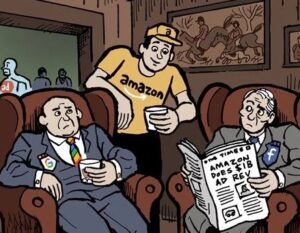Kinder Gardeners
The Trade Desk’s disgruntled competitors and SSP antagonists sometimes complain that TTD is turning into a walled garden.
And, to be fair, a handful of its platform products do claim performance benefits at the cost of transparency.
The Trade Desk’s Data Alliance, for instance, white labels and sources data without buyers necessarily knowing which vendors were used. Not to mention that the Walmart Connect DSP is pretty much a walled garden, just built on TTD’s pipes. Meanwhile, Ad Age reports that SSPs are concerned about Kokai deprioritizing their deal IDs.
Still, is TTD really a walled garden? For one, it doesn’t own media. And TTD still usually tries to pass along full log files.
But it’s worth understanding where these complaints are coming from: fear. TTD has extended itself to the sell side with products like OpenPath, which integrates directly with online and streaming publishers.
Perhaps more importantly, though, TTD now has a self-preferential pipeline.
Rather than working with SSPs for access to publishers and having to bid against multiple other DSPs, The Trade Desk goes straight to media companies with an offer they can’t refuse: Integrate or the fire hose of demand will turn into a trickle.
Clippers Gonna Clip
Apparently, there’s only one way to go viral these days: hire “clippers.”
Despite what it sounds like, these folks aren’t coming to cut your grass or trim your hair. Rather, they’re adept at taking longer-form videos – anything from podcasts to movies – and cutting them into bite-sized, well, clips.
Now, creators and marketers have begun hiring designated clippers to edit videos and stream them across Instagram and TikTok.
The only way to ensure that a clip will go viral, according to Roy Lee, the 21-year-old founder of AI note-taking startup Cluely, is to “post it across thousands of different accounts.” Cluely hires clippers to share its promotional content widely online, he tells the Wall Street Journal – because anyone who posts on just one channel is “stupid.”
And business is good.
Kanoah Cunningham, a recent University of Arizona business graduate, quit his finance job to run a team of clippers, a gig he claims nets him $20,000 to $30,000 per month.
Cunningham and his clipper crew “saturate” the web with their clips, the WSJ reports, until “they are almost impossible to miss.” The clips often feature shocking or absurd content (some of which is wholly inaccurate) to catch people’s attention.
Zombie Quibi
Quibi is back, baby!
Well, not exactly. But The New York Times has a profile on MicroCo, a new well-heeled Hollywood startup that’s taking up Quibi’s mantle as a super-short, mobile-first developer-slash-production studio. Although “generation studio” would be more precise.
Micro-drama apps are a multibillion dollar category in China, and NYT cites analysts who forecast it will become a $10 billion market outside China by 2027. Which, okay.
What’s a micro-drama? It’s super-brief episodic content – think one- or two-minute long installments – that make up “seasons” ranging from 30 to 150 parts. MicroCo plans to auto-generate this type of content.
“Everything will have a human touch,” says MicroCo CEO Jana Winograde, who is also the former president of Showtime. “But technology is going where it’s going.”
Typical studio productions cost 10 to 40 times more than what MicroCo spends per minute of an episode. Sure, but MicroCo’s episodes are only a minute or so long.
The idea, Winograde says, is to present “plot tension” in the first three seconds and a dramatic hook within 23 seconds. Micro-dramas tend to have cliffhanger endings. Also, did we mention that they’re less than two minutes long?
MicroCo will have a freemium model, meaning that people can watch for free, but they’ll have to pay to unlock content. The company may also run advertising, TBD.
Though ads would really eat into that one-minute runtime, huh.
But Wait! There’s More!
Robyn Roberts, NYT’s senior director of ad monetization, details the power of direct deals. [AdMonsters]
The Match Group (which owns Tinder, Hinge, Match.com and other dating sites) will pay $14 million to settle an FTC case involving misleading advertising. [Fortune]
Despite the hype, publishers aren’t prioritizing generative AI-based search optimization. [Digiday]
The ad industry is hiring fewer younger workers than it did in 2022. [Adweek]
ChatGPT will no longer remove old models without warning as it did during the most recent GPT-5 update. [The Verge]
Vanity Fair shuts down several verticals, lays off several prominent writers and makes plans to scale back on reviews and trade coverage. [Variety]
A University of Amsterdam study found that six proposed fixes to social media toxicity had little effect because negative outcomes are structurally embedded in the tech and its incentive structure. [ArsTechnica]
Gartner predicts that AI will enter the “trough of disillusionment” by next year since nearly 80% of companies say they’ve seen no real impact to their bottom lines from using generative AI. [NYT]
You’re Hired!
Marketing data platform Aqfer hires Bill Schild as CEO. [release]
Here’s today’s AdExchanger.com news round-up… Want it by email? Sign up here.













